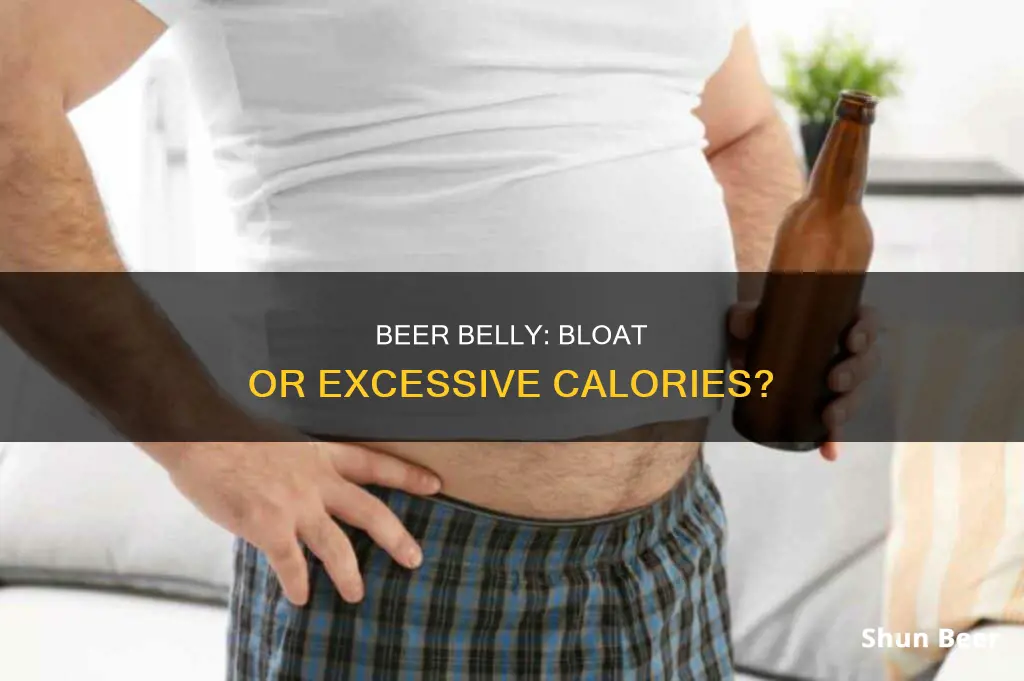
The term beer belly is a misnomer, as it's not exclusively caused by booze. Even teetotalers can develop the type of extra abdominal fat that's sometimes associated with drinking beer. However, alcohol does play a role in weight gain and can cause bloating, which can contribute to a protruding belly. So, what's the connection between beer and belly fat? And is bloating a factor?
| Characteristics | Values |
|---|---|
| Cause of beer belly | Excessive calories, alcohol's interference with fat burning, hormonal changes, genetics, age, sex, diet, exercise, and smoking |
| Alcohol's role in weight gain | High calorie content, stimulation of appetite, and impairment of judgment |
| Alcohol's role in bloating | Dehydration, irritation of the digestive system, inflammation in the stomach and intestines, carbonation, and high carbohydrate content |
What You'll Learn

Alcohol intake is associated with bigger waists
Alcohol intake is indeed associated with bigger waists. Alcoholic drinks are typically high in calories, with a standard 12-ounce beer containing 153 calories, a glass of wine containing 125 calories, and a serving of distilled liquor containing 90-100 calories. Beer, in particular, can be problematic as it is often consumed in excess, leading to a serious calorie overload. Alcohol also stimulates your appetite, causing you to eat more than you otherwise would, and it can impair your judgment, leading to less healthy food choices.
In addition to the excess calories, alcohol interferes with your body's ability to burn fat. When you drink alcohol, your liver burns alcohol instead of fat. This means that regular alcohol consumption can lead to an increase in body fat, especially around the belly, giving rise to the term "beer belly."
The link between alcohol consumption and bigger waists is further supported by research. Studies have found that men who drank more than three drinks per day were 80% more likely to have a lot of belly fat than those who drank less. Additionally, binge drinking, or consuming more than four drinks at one time, has been linked to an increased risk of belly fat, regardless of the type of drink.
While moderate drinking of one beer per day or less may not be directly linked to a "beer belly", excessive alcohol consumption can certainly contribute to weight gain and an increase in waist circumference. Therefore, it is important to keep alcohol intake within recommended limits and lead a healthy, active lifestyle to maintain a healthy weight and waistline.
Calories in Sam Adams Cold Snap Beer Revealed
You may want to see also

Beer contains as many calories as soft drinks
Beer bellies are caused by consuming too many calories, and beer contains as many calories as soft drinks. A typical 12-ounce beer has as many calories as a can of Coke (140). Some beers have twice that amount. A beer typically has 150 calories, and if you drink several in one sitting, you can experience a serious calorie overload.
Beer is high in carbs and alcohol but low in almost all other nutrients. The calorie content of beer depends on its strength—the more alcohol it contains, the more calories it has. Alcohol contains about seven calories per gram, which is higher than carbs and protein (four calories per gram) but lower than fat (nine calories per gram).
Soft drinks are generally considered empty calories, delivering little nutritional value. Juices, on the other hand, can be rich in vitamins and micronutrients but are also high in carbs due to their sugar content.
Alcoholic beverages, like many other drinks, contain calories that can add up quickly. Going out for a couple of drinks can easily add 500 or more calories to your daily intake. Most alcoholic drinks have little to no nutritional value.
The main cause of a beer belly is consuming excess calories, whether from alcohol, sugary beverages, or oversized portions of food. Alcohol seems to have a particular association with fat in the midsection. This is because when you drink alcohol, your liver burns alcohol instead of fat.
Stroh's Beer Calories: How Many in a Bottle?
You may want to see also

Alcohol can cause bloating due to dehydration
Alcohol is a diuretic, which means drinking it increases urine production and causes the body to lose water. This loss of fluids can lead to dehydration, causing the body to retain water in an attempt to rehydrate itself. This can result in swelling or puffiness in various parts of the body, including the face, stomach, and limbs.
Drinking alcohol can also irritate the digestive system and cause inflammation in the stomach and intestines, leading to gas, discomfort, and bloating. This is especially true if you consume large amounts of alcohol or have an underlying digestive condition such as irritable bowel syndrome (IBS).
Beer can cause bloating due to its carbonation and high carbohydrate content. The fermentation process in beer can also produce gas in the digestive system, leading to feelings of fullness and discomfort.
To prevent alcohol bloating, it is important to moderate your alcohol consumption and stay hydrated. Drinking plenty of water before, during, and after drinking alcohol can help counteract its dehydrating effects and prevent fluid retention. Eating a balanced meal before drinking can also help slow down the absorption of alcohol and reduce the risk of bloating and other digestive issues.
If you experience alcohol bloating, drinking plenty of water, eating a light and balanced meal, and avoiding carbonated drinks can help reduce bloating and discomfort. Over-the-counter medications such as antacids or simethicone can also help relieve gas and other digestive symptoms.
Calorie Count of Alaskan Amber Beer Explained
You may want to see also

Alcohol can irritate the digestive system
Additionally, alcohol interferes with fat burning. When alcohol is consumed, the liver prioritizes burning off alcohol instead of fat. This interference with the liver's ability to metabolize fats can contribute to weight gain. Alcohol also stimulates your appetite and can impair your judgment, leading to less healthy food choices and increased calorie intake.
The fermentation process in beer can produce gas in the digestive system, leading to feelings of fullness and discomfort. Beer's carbonation and high carbohydrate content can also contribute to bloating. Furthermore, alcohol is often mixed with sugary and carbonated liquids, which can worsen inflammation and cause gas, discomfort, and bloating.
To prevent and alleviate alcohol-related digestive issues, it is important to moderate alcohol consumption, stay hydrated, and eat balanced meals before drinking.
Calories in Carlsberg Beer: Nutritional Facts and Figures
You may want to see also

Drinking less alcohol can help reduce beer belly
Drinking less alcohol can help reduce a beer belly. Beer bellies are caused by a combination of excessive calories and alcohol's ability to prevent the body from burning fat. Alcohol stimulates your appetite and can impair your judgment, leading to less healthy food choices.
Beer contains as many calories as a soft drink, and a typical beer has 150 calories. If you down several in one sitting, you can end up with a serious calorie overload. Alcohol also contains about seven calories per gram, which is higher than carbs and protein.
When you drink alcohol, your liver burns alcohol instead of fat. This means that drinking alcohol can prevent your body from burning fat. Regular drinking can, therefore, contribute to an increase in body fat, especially around the belly.
Men tend to store fat around their bellies, and as men age, their hormone levels decrease, making them more likely to store fat in their midsections.
Drinking less alcohol can help reduce a beer belly. This can be achieved by drinking light beers with 100 calories or less, limiting the number of drinks per day, or drinking only on weekends. Alternating alcoholic drinks with low-calorie, non-alcoholic beverages can also help.
In addition to reducing alcohol intake, staying hydrated by drinking plenty of water before, during, and after drinking alcohol can help prevent its inflammatory effects on the body. Eating a healthy meal before or with your drinks can also help resist the temptation of high-calorie bar food.
Calories in Hefeweizen Beer: What You Need to Know
You may want to see also
Frequently asked questions
A beer belly is caused by consuming too many calories. A typical beer has 150 calories, and drinking several in one sitting can lead to a calorie overload. Alcohol also stimulates your appetite, causing you to eat more.
Alcohol is a diuretic, which increases urine production and causes the body to lose water. This leads to dehydration, causing the body to retain water and resulting in a swollen or puffy appearance.
To prevent alcohol bloating, it is recommended to stay hydrated by drinking plenty of water before, during, and after consuming alcohol. To treat bloating, drinking water, eating a light meal, and taking over-the-counter medications like antacids can help alleviate symptoms.







